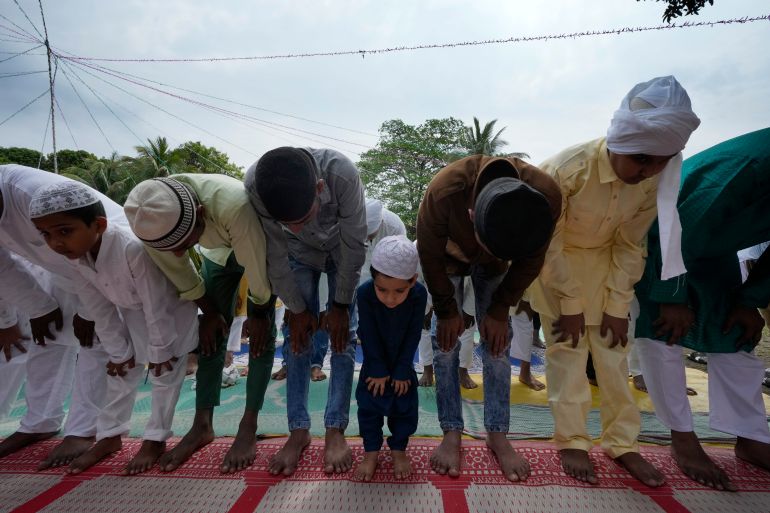US religious freedom panel again recommends India for blacklist
For a fourth year, the independent body says India should be singled out for discrimination against Muslims and other groups.

An independent commission in the United States has, for the fourth year in a row, recommended that India’s government, led by Prime Minister Narendra Modi, be added to a religious freedom blacklist, saying that conditions in the country for religious minorities “continued to worsen” throughout 2022.
In its annual report on Monday, the United States Commission on International Religious Freedom (USCIRF) again called on the US Department of State to designate India as a “country of particular concern”.
Keep reading
list of 3 itemsUS official for religious freedom slams hijab ban in Indian state
Closed Kashmir main mosque belies India’s religious freedom claim
The independent panel has made appeals for the designation since 2020. The label accuses a government of “systematic, ongoing [and] egregious violations” of religious freedom and opens the door to economic sanctions.
The body said that the Indian government “at the national, state and local levels promoted and enforced religiously discriminatory policies” in 2022. Those included “laws targeting religious conversion, interfaith relationships, the wearing of hijabs and cow slaughter, which negatively impact Muslims, Christians, Sikhs, Dalits and Adivasis (indigenous peoples and scheduled tribes)”.
The report noted that about 14 percent of India’s population of 1.4 billion is Muslim, about 2 percent is Christian, and 1.7 percent is Sikh. Nearly 80 percent of the country is Hindu.
The panel further asserts that the Indian government, led by Modi’s Bharatiya Janata Party (BJP), “continued to suppress critical voices — particularly religious minorities and those advocating on their behalf”.
IAMC welcomes the @USCIRF's decision to recommend India as a Country of Particular Concern (CPC) for its severe violations of human rights and religious freedoms for the fourth consecutive year.
CPC is a designation reserved for the world’s worst violators of religious freedom. pic.twitter.com/tlmxKE7thT
— Indian American Muslim Council (@IAMCouncil) May 1, 2023
The US panel only offers recommendations and has no ability to set policy. There was little expectation the State Department would adopt the commission’s position, as Washington and New Dehli have continued to strengthen their ties in a bid to counter China’s influence in the Indo-Pacific region.
In its report, the religious freedom watchdog noted the administration of US President Joe Biden “failed to designate India” as a “country of particular concern” after it made the recommendation in previous years.
“The United States and India continued to maintain strong bilateral ties around economic trade and technology. Trade reached $120 billion in 2022, making the United States India’s largest trading partner,” the report said.
“President Biden and Prime Minister Narendra Modi interacted on multiple occasions, including the G20 and G7 Summits and the Quad Leaders Summit,” it added, the latter referring to the informal grouping of the US, India, Japan and Australia.
The Indian government did not immediately respond to the latest report. Following last year’s recommendation, New Delhi’s foreign ministry spokesman Arindam Bagchi accused senior US officials of making “ill-informed” and “biased” comments.
“As a naturally pluralistic society, India values religious freedom and human rights,” Bagchi said in a statement at the time.
For its part, the Indian American Muslim Council said the latest USCIRF report “reaffirms what [the rights group] has been saying for years: that India’s government, under Prime Minister [Narendra Modi] has continued to systematically violate the religious freedom of minority communities, particularly Muslims and Christians”.
More recommendations for blacklist
The report also called on the Biden administration to add Afghanistan, Nigeria, Syria and Vietnam to its blacklist, and for the redesignation of Myanmar, China, Cuba, Eritrea, Iran, Nicaragua, North Korea, Pakistan, Russia, Saudi Arabia, Tajikistan and Turkmenistan.
The panel first made the recommendation for Afghanistan last year, following the Taliban’s takeover of the country in August 2021. Afghanistan has long been on the commission’s watch list, and the Taliban itself had been designated of “particular concern” in some of the panel’s earliest reports, from 2000 and 2001.
The commission said the group “violates the freedom of religion or belief of religious minorities; women; members of the lesbian, gay, bisexual, transgender, queer, and intersex (LGBTQI+) community; and Afghans with differing interpretations of Islam”.
In Nigeria, the report focused on several blasphemy convictions in 2022 as well as mob violence related to allegations of blasphemy. It noted that the Biden administration did not heed a similar recommendation made last year, although Nigeria was briefly designated under the administration of former President Donald Trump.
In Syria, the panel highlighted government violence against the Druze communities amid the country’s ongoing civil war.
In Vietnam, the commission said, “authorities intensified their control and persecution of religious groups”, including Montagnard and Hmong Protestants, Cao Dai followers, Hoa Hao Buddhists, Unified Buddhists and other religious groups not registered with the government.